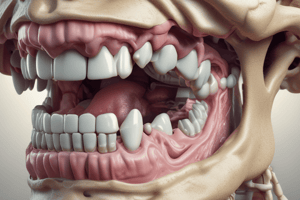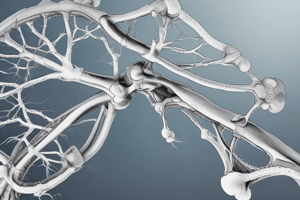Podcast
Questions and Answers
What is the age range for the occurrence of fibrous dysplasia?
What is the age range for the occurrence of fibrous dysplasia?
- 4-18 years (correct)
- 20-35 years
- 2-10 years
- 10-25 years
What is the characteristic radiographic pattern of fibrous dysplasia?
What is the characteristic radiographic pattern of fibrous dysplasia?
- Ground-glass appearance
- Smoke screen pattern
- All of the above (correct)
- Ill-defined radiolucent pattern with few faint trabeculae of bone
What is the effect of mutated osteoblasts in fibrous dysplasia?
What is the effect of mutated osteoblasts in fibrous dysplasia?
- Formation of abnormal fibrous tissue
- Formation of lamellar bone in place of woven bone
- Formation of woven bone in place of lamellar bone (correct)
- Formation of normal bone marrow
What is the characteristic feature of teeth in fibrous dysplasia?
What is the characteristic feature of teeth in fibrous dysplasia?
What is the complication of fibrous dysplasia that is associated with deformation of the orbit?
What is the complication of fibrous dysplasia that is associated with deformation of the orbit?
What is the treatment approach for fibrous dysplasia?
What is the treatment approach for fibrous dysplasia?
What is the mode of inheritance of cherubism?
What is the mode of inheritance of cherubism?
What is the classification of bone diseases that includes fibrous dysplasia?
What is the classification of bone diseases that includes fibrous dysplasia?
What is the characteristic feature of cherubism?
What is the characteristic feature of cherubism?
What is the characteristic of fibrous dysplasia in the early stages of embryonic development?
What is the characteristic of fibrous dysplasia in the early stages of embryonic development?
What is the name of the syndrome resulting from a mutation affecting osteoblasts, melanocytes, and endocrine cells?
What is the name of the syndrome resulting from a mutation affecting osteoblasts, melanocytes, and endocrine cells?
What is the term for fibrous dysplasia affecting a single bone?
What is the term for fibrous dysplasia affecting a single bone?
What is the characteristic of facial fibrous dysplasia?
What is the characteristic of facial fibrous dysplasia?
What is the result of a mutation occurring during postnatal life?
What is the result of a mutation occurring during postnatal life?
What is the characteristic of Jaffe type fibrous dysplasia?
What is the characteristic of Jaffe type fibrous dysplasia?
What is the term for fibrous dysplasia affecting multiple bones?
What is the term for fibrous dysplasia affecting multiple bones?
Flashcards are hidden until you start studying
Study Notes
Classification of Bone Diseases
- Bone diseases can be classified into 7 categories: Developmental, Metabolic, Inflammatory, Cystic, Tumors, Hormonal, and Deficiency
Developmental Bone Diseases
- Fibrous Dysplasia: a developmental tumorlike condition characterized by replacement of normal bone by fibrous connective tissue with irregular bony trabeculae (fibro-osseous lesion)
Fibrous Dysplasia
- Can occur in three forms: Monostotic, Polyostotic, and Syndrome-related
- Monostotic FD: affecting a single bone
- Polyostotic FD: affecting multiple bones
- Syndrome-related: associated with McCune-Albright Syndrome or Jaffe Type
McCune-Albright Syndrome
- Results from mutation of a pluripotent stem cell in the early stages of embryonic development
- Characterized by multiple bone lesions (polyostotic), cutaneous (café au lait) pigmentation, and endocrine disturbances
Jaffe Type
- Results from mutation of osteoblasts and melanocytes
- Characterized by multiple bone lesions (polyostotic) and cutaneous (café au lait) pigmentation
Facial Fibrous Dysplasia
- Monostotic fibrous dysplasia affecting the maxilla
- Etiopathogenesis: Non-heritable post zygotic somatic mutation in GNAS1 gene
- Clinical features: painless, unilateral, slowly growing swelling, proptosis, maxillary sinus obliteration, nasal obstruction, and dental manifestations
Radiographic Features of Facial Fibrous Dysplasia
- 3 patterns depending on the amount of formed lesional bone: Orange peel pattern, Ground-glass appearance, Ill-defined radiolucent pattern with few faint trabeculae of bone, and Smoke screen pattern
Microscopic Features of Facial Fibrous Dysplasia
- Osteoid stage: Resorption of the original bone and replacement by dysplastic fibrous tissue, Trabeculae of osteoid/woven bone are laid down equidistant from each other and are Chinese letter shaped or U,C and W shaped
- Osseous stage: Calcification of osteoid occurs & formation of woven bone is complete without osteoblastic rimming, Resorption of the new trabeculae occurs and the whole cycle is repeated
Complications of Facial Fibrous Dysplasia
- Malocclusion, Rarely osteosarcoma, Deformity of the orbit, Obliteration of the maxillary sinus
Treatment of Facial Fibrous Dysplasia
- Plastic surgery after 21 years of age
Cherubism
- Developmental jaw swelling, its growth stops with cessation of the skeletal growth
- Etiopathogenesis: Hereditary, AD, Cherubism gene (SH3BP2) which enhances osteoclastogenesis
Studying That Suits You
Use AI to generate personalized quizzes and flashcards to suit your learning preferences.




